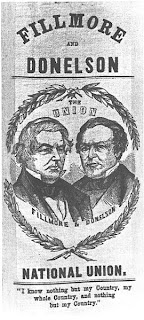"ALL MEN ARE CREATED EQUAL EXCEPT NEGROES...FOREIGNERS AND CATHOLICS"
Philadelphia, Pennsylvania (JFK+50) 159 years ago today, February 18, 1856, delegates of the American Party, a.k.a. the "Know-Nothings", gathered here in Philadelphia to nominate their first candidate for President of the United States.*
The Know-Nothings, made up of Protestant males, offered to purify America by limiting or even ending the influences of newly-arrived immigrants. The unprecedented immigrant migration from 1830 to 1860 contributed to the "nativist" movement.
Citizen Know-Nothing
The fear of Catholic immigrants also led to a backlash against the Democratic Party which attracted many of them to their fold.
By 1854, the Know-Nothings swept the state of Massachusetts and elected one of their own as Mayor here in Philadelphia. Robert T. Conrad promised to crack down on crime and appoint only nativists to office. He also promised to close the saloons.
Membership in the American Party, as it came to be called, increased from 50,000 to 1 million. By December 1855, 43 Members of Congress classified themselves as Know-Nothings.
On February 15, 1856, the American Party nominated former United States President Millard Fillmore as their presidential standard-bearer and Andrew Jackson Donelson of Tennessee as his running-mate.
The Know-Nothings' fall, however, proved to be just as fast as their rise. In today's post on Real Clear Politics, Carl M. Cannon writes...
"The seeds for the Know-Nothing's demise were planted at their own convention (when) a wing of Southerners moved to pass a platform plank calling for the preservation of slavery."
This led to the bolting of Northern and Midwestern Know-Nothings to the Republican Party and the subsequent demise of the American Party.
Abraham Lincoln had written in a letter dated August 24, 1855...
"When the Know-Nothings get control, (the Declaration of Independence) will read 'all men are created equal, except negroes, and foreigners and catholics.'"
In the Election of 1856, Democrat James Buchanan won (174) defeating Republican John C. Fremont (114) and Millard Fillmore (8). The Know-Nothings won 21.5% of the vote and only carried one state, Maryland.
*Note: In the Election of 1852, the Native American Party had nominated Daniel Webster of Massachusetts as their presidential candidate as had the Union Party, an off-shoot of the Whig Party.
SOURCE
"Immigration and the Rise and Fall of the Know-Nothing Party," by Carl M. Cannon, Real Clear Politics, February 18, 2015, www.realclearpolitics.com/
Philadelphia, Pennsylvania (JFK+50) 159 years ago today, February 18, 1856, delegates of the American Party, a.k.a. the "Know-Nothings", gathered here in Philadelphia to nominate their first candidate for President of the United States.*
The Know-Nothings, made up of Protestant males, offered to purify America by limiting or even ending the influences of newly-arrived immigrants. The unprecedented immigrant migration from 1830 to 1860 contributed to the "nativist" movement.
Citizen Know-Nothing
Uncle Sam's Youngest Son
By Sarony & Co., Lithographers
Library of Congress (1854)
By 1854, the Know-Nothings swept the state of Massachusetts and elected one of their own as Mayor here in Philadelphia. Robert T. Conrad promised to crack down on crime and appoint only nativists to office. He also promised to close the saloons.
Membership in the American Party, as it came to be called, increased from 50,000 to 1 million. By December 1855, 43 Members of Congress classified themselves as Know-Nothings.
On February 15, 1856, the American Party nominated former United States President Millard Fillmore as their presidential standard-bearer and Andrew Jackson Donelson of Tennessee as his running-mate.
The Know-Nothings' fall, however, proved to be just as fast as their rise. In today's post on Real Clear Politics, Carl M. Cannon writes...
"The seeds for the Know-Nothing's demise were planted at their own convention (when) a wing of Southerners moved to pass a platform plank calling for the preservation of slavery."
This led to the bolting of Northern and Midwestern Know-Nothings to the Republican Party and the subsequent demise of the American Party.
Abraham Lincoln had written in a letter dated August 24, 1855...
"When the Know-Nothings get control, (the Declaration of Independence) will read 'all men are created equal, except negroes, and foreigners and catholics.'"
Know-Nothing Banner of 1856
"I know nothing but my Country,
my whole Country, and nothing
but my Country."
In the Election of 1856, Democrat James Buchanan won (174) defeating Republican John C. Fremont (114) and Millard Fillmore (8). The Know-Nothings won 21.5% of the vote and only carried one state, Maryland.
*Note: In the Election of 1852, the Native American Party had nominated Daniel Webster of Massachusetts as their presidential candidate as had the Union Party, an off-shoot of the Whig Party.
SOURCE
"Immigration and the Rise and Fall of the Know-Nothing Party," by Carl M. Cannon, Real Clear Politics, February 18, 2015, www.realclearpolitics.com/

